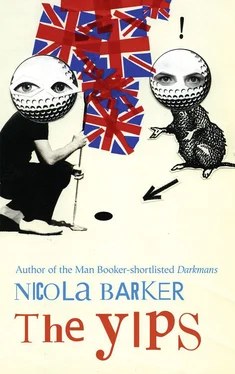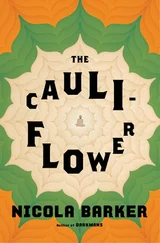Nicola Barker - The Yips
Здесь есть возможность читать онлайн «Nicola Barker - The Yips» — ознакомительный отрывок электронной книги совершенно бесплатно, а после прочтения отрывка купить полную версию. В некоторых случаях можно слушать аудио, скачать через торрент в формате fb2 и присутствует краткое содержание. Год выпуска: 2012, Издательство: Fourth Estate, Жанр: Современная проза, на английском языке. Описание произведения, (предисловие) а так же отзывы посетителей доступны на портале библиотеки ЛибКат.
- Название:The Yips
- Автор:
- Издательство:Fourth Estate
- Жанр:
- Год:2012
- ISBN:нет данных
- Рейтинг книги:4 / 5. Голосов: 1
-
Избранное:Добавить в избранное
- Отзывы:
-
Ваша оценка:
- 80
- 1
- 2
- 3
- 4
- 5
The Yips: краткое содержание, описание и аннотация
Предлагаем к чтению аннотацию, описание, краткое содержание или предисловие (зависит от того, что написал сам автор книги «The Yips»). Если вы не нашли необходимую информацию о книге — напишите в комментариях, мы постараемся отыскать её.
The Yips — читать онлайн ознакомительный отрывок
Ниже представлен текст книги, разбитый по страницам. Система сохранения места последней прочитанной страницы, позволяет с удобством читать онлайн бесплатно книгу «The Yips», без необходимости каждый раз заново искать на чём Вы остановились. Поставьте закладку, и сможете в любой момент перейти на страницу, на которой закончили чтение.
Интервал:
Закладка:
She shudders.
Gene struggles to expel a sudden vision in his mind of her reclining, soapily, in the tub. He clears his throat. ‘It was nothing,’ he mutters, then stares at the corner of her lip, fixedly, where her lipstick is smudged.
‘Well thanks for that, anyway,’ she says, her mouth tightening, self-consciously. He quickly adjusts his gaze and notices a light glow of perspiration on her forehead, then a subtle glint of moisture on her upper lip, a touch of shine on her chin, a further, gentle glimmer on her breastbone …
He quickly averts his gaze again.
‘I’m actually …’ She glances over her shoulder, frowning. ‘I’m actually in a bit of a fix’ — she leans forward and gently tips his clipboard towards her so that she can read the name on his identification badge — ‘Eugene,’ she clumsily finishes off.
Gene can’t help noticing her bare arms as she leans towards him. Her arms are very smooth. Utterly hairless. Slightly freckled. Her skin has a strange kind of … of texture to it and exudes — his nose twitches — a slight aroma of incense (Cedarwood? Sandalwood? Frankincense? Musk?).
Under her semi-transparent plastic apron, she’s wearing a strangely old-fashioned, tight, cap-sleeved khaki shirt (in the military style), unfastened to the breastbone with a jaunty, cotton turquoise bra (frilled in shocking red nylon) peeking out from between the buttons.
Gene blinks and looks lower. On her bottom half he can make out a pair of dark, wide-cut denims, rolled up to the knee. On her feet, some round-toed, turquoise shoes with neat ankle straps and high, straight heels.
‘… I mean I know it’s a little cheeky of me,’ she’s saying, ‘but it’s only eight doors down. The other side of the road — number nineteen …’
‘Pardon?’
Gene tries to re-focus.
‘My niece. I have to go and fetch her. It’s just …’ — she indicates over her shoulder — ‘I really should get back to my client. She wasn’t very happy about …’
She winces.
Gene stares at her for a moment, confused.
‘And if you’re headed in that direction anyway …’
He finally realizes what she’s getting at. ‘Oh. Wow. You mean you want me to go and …?’
‘Would you mind?’ She bites down on her lower lip.
‘Uh, no. No. Of course not. It’s fine,’ Gene insists. He glances up the road, appalled.
‘I’d go myself’ — she indicates over her shoulder again — ‘it’s just that I really should …’
‘Of course.’
Gene nods, emphatically. They stare at each other, wordlessly, in a strange kind of agony, like two distant acquaintances who’ve just met up, arbitrarily, in the waiting room of a VD clinic.
‘So what’s her name?’ Gene finally enquires.
‘Her name? Uh …’ She puts a tentative hand to her headscarf. ‘You know I honestly can’t remember …’ She frowns. ‘Isn’t that terrible? Something unpronounceable, like … like Hokakushi …’ Her frown deepens. ‘Or Hokusha. It’s Japanese.’
‘Your niece is Japanese?’ Gene deadpans.
‘My niece?’ The woman looks mystified, then mortified. ‘Oh God! Sorry …’ She shakes her head. ‘I’ve been up all night. I’m not firing on all cylinders, obviously. My niece … My niece . My niece is called Nessie. Nessa. And the woman who’s minding her is called Sasha …’ She pauses, sheepishly. ‘And I’m Valentine.’
She holds out a gloved hand. Gene reaches out his own, in automatic response, but before their fingers can touch, she quickly withdraws hers, apologizing, and starts trying to remove the plastic glove, muttering something about ‘needing to maintain hygiene’.
‘Don’t worry.’ Gene smiles, taking a small step back. ‘I should probably …’
‘Yes …’ Valentine’s eyes are now lingering on his wedding ring. ‘Well I suppose I’d better …’ She thumbs over her shoulder. ‘My poor client …’
‘Absolutely.’ Gene takes another step. He inspects his watch. She remains where she is, though, still gazing at him. He isn’t sure why, exactly.
‘You have the original glass,’ he mumbles, pointing, somewhat uneasily.
‘Pardon?’
‘The original glass panels, in the door …’ He can gradually feel his colour rising. ‘You’re one of the only houses left on the street.’
‘Oh. Yeah. Yeah . The glass …’ Valentine peers across at it, fondly. ‘My dad always loved it. He was completely obsessed by this period of design. I guess you could say it was his …’
Gene suddenly turns — while she’s still talking — and hurries down the short path, then out of the garden (the gate swings gently behind him). He knows it’s a little strange. He knows it’s a little rude. And even as he’s walking — just as soon as he starts walking — he’s reproaching himself for it (‘What is this? What are you playing at? Are you crazy?!’).
Valentine watches him go, surprised. He senses her blue eyes upon him, and feels — possibly for the first time in his adult life — an excruciating awareness of all his physical shortcomings. He automatically lifts his chin and pushes back his shoulders. He tightens his stomach. But even as he does so he’s haranguing himself for it, lambasting himself for it (‘You bloody fool. This is ridiculous. This is laughable ’). His body feels leaden and yet light, all at once. His chest feels too small to contain his breath. He longs — above everything — to escape, to bolt, to flee. It’s as much as he can do not to break into a sprint.
‘They’re Gene’s,’ a sullen voice announces. ‘All of them.’
‘ Huh? ’
Ransom glances up, startled. He’s just been idly rifling through a deep drawer in a heavy, dark (and profoundly unfashionable) Victorian sideboard in a somewhat cramped and boxy sitting room. In one hand he holds a bowl of cereal (mini shredded-wheat, drenched in milk, which he’s eating with a fork), in the other he holds a medal. The person sullenly addressing him is a boy — a short, thick-set teenager with a dense mop of black hair (carefully arranged to hang, with a fastidious lopsidedness, over one eye) and a copy of Bruce Lee’s Artist of Life propped under his elbow.
‘I don’t know why he keeps them there,’ the boy continues, stolidly. ‘He’s got dozens of the stupid things. Mum’s always nagging at him to display them properly.’
‘I was looking for a spoon.’ Ransom quickly drops the medal back into the drawer, adjusts the towel he’s wearing (a pink towel) and turns to engage with the boy directly.
‘You finished the milk,’ the boy mutters, darting Ransom’s cereal bowl a petulant look before silently retreating.
Ransom glances down at his bowl, shrugs, devours another forkful, saunters over to a nearby bookshelf and casually scans the books on display there. After a brief inspection he soon deduces that the books are divided — by and large — into two main categories: the military and the spiritual. Ransom instinctively shrinks from the religious side and focuses his attention on the military end instead. Here, his eyes run over Clausewitz’s On War , Conrad Lorenz’s On Aggression , Richard Holmes’s Acts of War , then rest — for a brief interlude — on Wendy Holden’s Shell Shock . He carefully places down his bowl and pulls it out, opening it, randomly: ‘Too many people are jumping on the trauma bandwagon,’ he reads, ‘in a society where to be a victim confers on people a state of innocence.’
He scowls, tips the book over and inspects the cover, then slaps it shut and shoves it, carelessly, back into the shelves again. Next he removes the Clausewitz. ‘The element of chance, only, is wanting to make of war a game,’ he reads, ‘there is no human affair which stands so constantly and so generally in close connection with chance as war …’ He scratches his head, intrigued. ‘War is a game both objectively and subjectively …’ he continues, and then, ‘Every activity in war necessarily relates to the combat, either directly or indirectly. The soldier is levied, clothed, armed, exercised, he sleeps, eats, drinks and marches all merely to fight at the right time and place.’
Читать дальшеИнтервал:
Закладка:
Похожие книги на «The Yips»
Представляем Вашему вниманию похожие книги на «The Yips» списком для выбора. Мы отобрали схожую по названию и смыслу литературу в надежде предоставить читателям больше вариантов отыскать новые, интересные, ещё непрочитанные произведения.
Обсуждение, отзывы о книге «The Yips» и просто собственные мнения читателей. Оставьте ваши комментарии, напишите, что Вы думаете о произведении, его смысле или главных героях. Укажите что конкретно понравилось, а что нет, и почему Вы так считаете.












